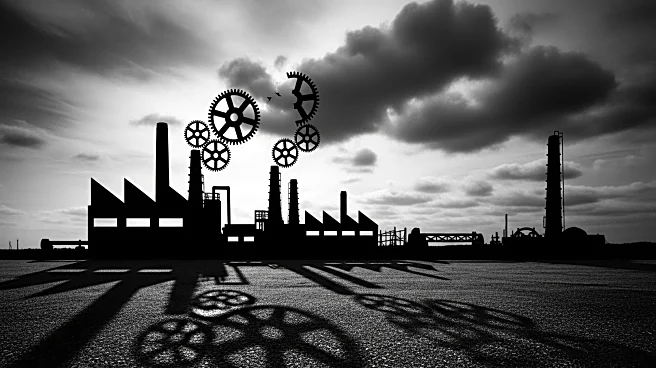What's Happening?
During President Trump's first term, tariffs imposed on aluminum and steel resulted in significant job losses in U.S. manufacturing sectors. According to economists Kadee Russ and Lydia Cox, these tariffs created approximately 1,000 new jobs in steelmaking but led to the loss of around 75,000 jobs in industries downstream from steel production. The tariffs were part of Trump's trade policy aimed at protecting domestic industries from foreign competition, but the highly automated nature of steelmaking meant that few jobs were created. The policy resonated with voters who were nostalgic for the well-paying manufacturing jobs of the 20th century, despite the adverse effects on employment in related sectors.
Why It's Important?
The impact of President Trump's tariffs highlights the complexities of trade policy and its effects on the U.S. economy. While intended to bolster domestic manufacturing, the tariffs inadvertently harmed industries reliant on steel and aluminum, leading to significant job losses. This situation underscores the need for careful economic analysis in policy-making to avoid unintended consequences. The job losses in downstream industries reflect broader challenges in adapting to global trade dynamics, where foreign producers often benefit from lower labor costs and state support. The tariffs' effects serve as a cautionary tale for future trade policies, emphasizing the importance of balancing protectionism with economic realities.
What's Next?
The long-term implications of the tariffs may prompt policymakers to reconsider the approach to trade and manufacturing support. As the U.S. continues to navigate global trade relationships, there may be increased pressure to develop strategies that protect domestic jobs without sacrificing competitiveness in downstream industries. Future administrations might explore alternative measures, such as investing in technology and workforce development, to enhance the resilience of U.S. manufacturing. Additionally, there could be calls for more comprehensive trade agreements that address the root causes of job displacement while fostering innovation and growth in affected sectors.
Beyond the Headlines
The tariffs' impact on U.S. manufacturing jobs also raises ethical and cultural questions about the role of government in shaping economic outcomes. The nostalgia for past manufacturing jobs reflects broader societal concerns about economic security and the changing nature of work. As automation and globalization continue to transform industries, there may be a need for cultural shifts in how work and economic success are perceived. This situation also highlights the ethical considerations in trade policy, where the benefits to certain sectors must be weighed against the broader societal costs.









